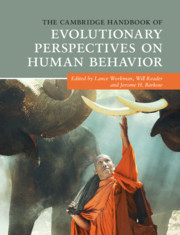Book contents
- The Cambridge Handbook of Evolutionary Perspectives on Human Behavior
- The Cambridge Handbook of Evolutionary Perspectives on Human Behavior
- Copyright page
- Dedication
- Contents
- Figures
- Tables
- Contributors
- Preface
- Acknowledgments
- Part I The Comparative Approach
- Part II Sociocultural Anthropology and Evolution
- Part III Evolution and Neuroscience
- Part IV Group Living
- Part V Evolution and Cognition
- Part VI Evolution and Development
- 21 Evolutionary Developmental Psychology
- 22 The Ontogeny and Evolution of Cooperation
- 23 Genomic Imprinting Is Critical for Understanding the Development and Adaptive Design of Psychological Mechanisms in Humans and Other Animals
- 24 Evolutionary Explanations for Bullying Behavior
- 25 Birth Order and Evolutionary Psychology
- Part VII Sexual Selection and Human Sex Differences
- Part VIII Abnormal Behavior and Evolutionary Psychopathology
- Part IX Applying Evolutionary Principles
- Part X Evolution and the Media
- Index
- References
24 - Evolutionary Explanations for Bullying Behavior
from Part VI - Evolution and Development
Published online by Cambridge University Press: 02 March 2020
- The Cambridge Handbook of Evolutionary Perspectives on Human Behavior
- The Cambridge Handbook of Evolutionary Perspectives on Human Behavior
- Copyright page
- Dedication
- Contents
- Figures
- Tables
- Contributors
- Preface
- Acknowledgments
- Part I The Comparative Approach
- Part II Sociocultural Anthropology and Evolution
- Part III Evolution and Neuroscience
- Part IV Group Living
- Part V Evolution and Cognition
- Part VI Evolution and Development
- 21 Evolutionary Developmental Psychology
- 22 The Ontogeny and Evolution of Cooperation
- 23 Genomic Imprinting Is Critical for Understanding the Development and Adaptive Design of Psychological Mechanisms in Humans and Other Animals
- 24 Evolutionary Explanations for Bullying Behavior
- 25 Birth Order and Evolutionary Psychology
- Part VII Sexual Selection and Human Sex Differences
- Part VIII Abnormal Behavior and Evolutionary Psychopathology
- Part IX Applying Evolutionary Principles
- Part X Evolution and the Media
- Index
- References
Summary
Research on bullying, mostly focusing on children of school age, has been active since the 1970s. Paralleling earlier work on aggression, bullying has often been described as maladaptive and dysfunctional behavior, and this has informed some intervention efforts. However, and again as for aggression generally, this view has been challenged in the 2000s (Ellis et al., 2012; Hawley, Little, & Rodkin, 2007; Kolbert & Crothers, 2003; Volk et al., 2012). It has been argued that bullying behavior is universal (historically and culturally, as well as in contemporary urban societies); that it is heritable, perhaps in part via temperament; and that it can have advantages for those who bully. The advantages would ultimately be for reproductive success, but via physical resources and social status, as well as attractiveness to the opposite sex.
- Type
- Chapter
- Information
- Publisher: Cambridge University PressPrint publication year: 2020
References
- 1
- Cited by

